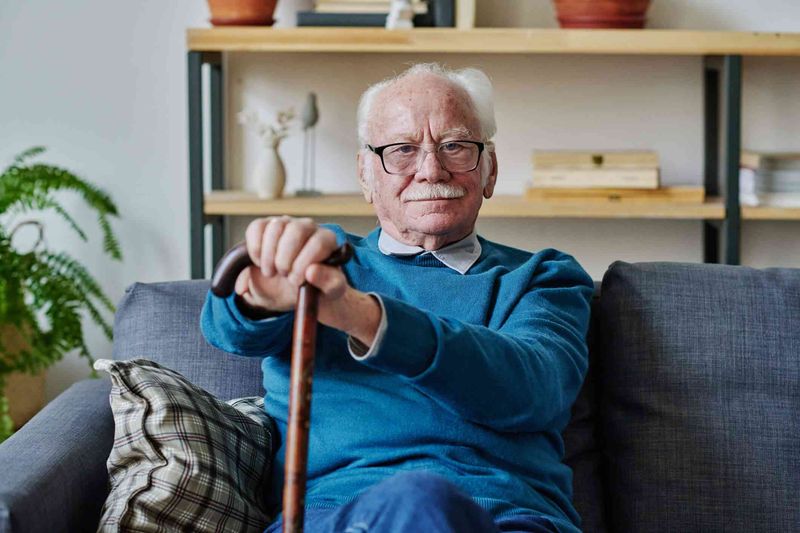In today’s fast-paced world, socializing can present unique challenges, especially for older men. While many value their independence and solitude, others may find themselves increasingly isolated.
In this blog post, we’ll delve into 18 specific reasons why older men might avoid socializing, offering insight into their perspectives and experiences.
From health concerns to shifts in interests, these reasons are as diverse as the individuals themselves.
Understanding these factors can pave the way for more empathetic interactions and offer pathways for those wishing to rekindle their social connections.
1. Health Concerns
Many older men face health challenges that may limit their social activities. Conditions such as arthritis, heart disease, and mobility issues can make it physically challenging to engage in social gatherings.
Attending events may require more energy and effort than they feel capable of exerting. Additionally, the fear of falling or experiencing health emergencies in public can be a significant deterrent.
As a result, they might prefer staying in the comfort of their homes where they feel safe and in control, choosing solitude over potential risk.
2. Loss of Friends
As men age, they often experience the loss of close friends, which can diminish their desire to socialize. The pain of losing lifelong companions can lead to feelings of loneliness and a reluctance to form new friendships.
Rebuilding a social circle can seem daunting, especially when the emotional investment feels heavy. Moreover, the fear of experiencing further losses may make them hesitant to open up to new people.
Consequently, many choose to live with cherished memories rather than face the uncertainties of new relationships.
3. Retirement Adjustments
Retirement can bring about significant lifestyle changes, and for some older men, adjusting to this new phase can be difficult. The loss of a structured daily routine and workplace social interactions can lead to feelings of displacement.
Without the regular engagement that a job provides, individuals may feel disconnected or even irrelevant. Finding new ways to fill the time can be overwhelming, leading to withdrawal from social settings.
Encouragement to explore new hobbies or community activities can help ease this transition and reignite social interests.
4. Generational Gaps
Generational gaps can play a significant role in why older men might avoid socializing. They may feel out of touch or unable to relate to younger generations’ interests and technological advancements.
This disconnect can lead to feelings of alienation, making social situations uncomfortable. The rapid pace of change in society might add to their sense of being left behind.
Bridging the generational divide by finding common interests or engaging in intergenerational activities can create opportunities for meaningful connections.
5. Financial Constraints
Financial constraints are a common reason that older men might avoid socializing. Fixed incomes and rising living costs may limit their ability to participate in activities that have a financial component.
Social gatherings often involve expenses, such as dining out or traveling, which might not be feasible for those on a tight budget. This can lead to a feeling of exclusion from social opportunities.
Finding budget-friendly or free community events can provide inclusive options for social interaction without financial stress.
6. Preference for Solitude
Some older men genuinely prefer solitude and find comfort in their own company. Solitude allows them to engage in self-reflection and pursue personal interests without the demands of social engagement.
For these individuals, alone time is rejuvenating and fulfilling, rather than lonely. They may have spent a life engaged in social activities and now value the peace and quiet of solitude.
Respecting their preference for solitude is important, while also ensuring they have support when needed.
7. Family Responsibilities
For some older men, family responsibilities take precedence over socializing. Whether it’s caring for grandchildren or supporting a spouse, these commitments can consume much of their time and energy.
The desire to prioritize family can lead to social withdrawal, even if it’s unintentional. Balancing these responsibilities with personal time can be challenging.
Encouragement to maintain a balance between family duties and social activities can help them sustain connections outside the family sphere.
8. Discomfort with Technology
In today’s digital age, technology plays a crucial role in maintaining social connections, but not all older men are comfortable using it. The rapid advancement of devices and platforms may be intimidating.
This discomfort can lead to reluctance in participating in online social activities or keeping up with tech-savvy friends and family. The fear of appearing incompetent might further discourage tech adoption.
Offering patience and guidance in learning new technology can empower them to embrace digital tools for socializing.
9. Changes in Interests
As people age, their interests often evolve, and older men may find they no longer share common interests with their previous social circles. This shift can lead to a natural separation from past connections.
Finding new groups or communities that align with current passions can reinvigorate their social lives. Engaging in interest-based clubs or activities can provide a platform for meeting like-minded individuals.
Encouragement to explore these new avenues can help them discover renewed enthusiasm for social interaction.
10. Physical Appearance Concerns
Concerns about physical appearance can deter older men from socializing. Aging comes with inevitable changes, and some men may feel self-conscious about their looks.
The pressure to maintain a certain image or meet societal expectations can make social situations daunting. This self-consciousness might lead to avoiding events where they feel judged.
Encouraging self-acceptance and focusing on positive attributes can help alleviate these concerns, allowing them to engage more freely in social activities.
11. Lack of Transportation
Transportation challenges are a practical barrier to socializing for many older men. Limited access to personal vehicles or public transportation can make attending social events difficult.
Reliance on others for rides may lead to feelings of dependency and reluctance to impose on friends or family. This can result in missed opportunities for social engagement.
Community programs that offer transport assistance or organizing carpooling with friends can help alleviate this issue, promoting greater social participation.
12. Mental Health Issues
Mental health issues, such as depression or anxiety, can significantly impact an older man’s willingness to socialize. These conditions can lead to withdrawal and a lack of motivation to engage with others.
The stigma surrounding mental health might also discourage them from seeking help or discussing their feelings. Addressing these challenges requires understanding and support from loved ones.
Providing access to mental health resources and encouraging open conversations can help them overcome barriers to social interaction.
13. Negative Past Experiences
Past negative experiences in social settings can lead to a reluctance to engage. Older men might have faced judgment, rejection, or misunderstandings, leaving them wary of repeating such encounters.
These memories can linger, influencing their comfort level in new social situations. Building trust and ensuring a supportive environment can encourage them to reconnect socially.
Offering positive experiences and gentle reassurance can gradually rebuild their confidence in social interactions.
14. Lack of Confidence
A lack of confidence can be a significant barrier to socializing for older men. They may doubt their ability to contribute meaningfully to conversations or fear not fitting in with new groups.
This self-doubt can stem from various factors, including past experiences or changes in physical or mental abilities. Providing opportunities for success and emphasizing their unique strengths can help boost confidence.
Encouraging participation in familiar, low-pressure settings can gradually enhance their social comfort and willingness to engage.
15. Cultural Expectations
Cultural or societal expectations can influence an older man’s social habits. In some cultures, older individuals might be expected to take on more reserved roles, reducing their inclination to socialize actively.
These expectations can create internal conflict between personal desires and perceived duties. Understanding and respecting cultural influences while also encouraging personal autonomy can help navigate these challenges.
Encouraging involvement in cultural groups or activities can provide a comfortable space for social interaction within familiar contexts.
16. Loss of a Partner
The loss of a partner can profoundly affect an older man’s social life. The absence of a long-term companion might lead to feelings of loneliness and an aversion to social settings that were once shared.
Grieving can be a lengthy process, during which social withdrawal is common. Encouragement to seek support groups or engage in activities can help them gradually rebuild their social networks.
Finding new companionship in shared interests can offer comfort and a renewed sense of community.
17. Changes in Living Situations
Changes in living situations, such as downsizing or moving to assisted living, can disrupt an older man’s social patterns. Adapting to new environments can be challenging, particularly when familiar social networks are left behind.
Establishing connections in a new setting might take time and effort, often leading to initial withdrawal. Support from family and community can ease this transition, offering opportunities to engage with new neighbors.
Encouragement to participate in community activities can help establish new social roots and foster a sense of belonging.
18. Busy Schedules
Contrary to common perceptions, some older men maintain busy schedules filled with personal projects, hobbies, or volunteering. This active lifestyle can limit time available for socializing, despite a willingness to engage.
Balancing commitments while finding time for social interactions can be challenging. Encouraging the integration of social events with existing interests can offer a practical solution.
Finding shared activities or group projects can create opportunities for socialization without compromising their busy routines.


















